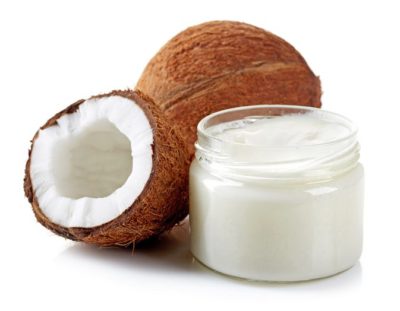
Recently, a Harvard professor made waves when he referred to coconut oil as “pure poison.” This ultimately led to a collective groan amongst health-minded individuals who are reaching the stage where they don’t know what to believe anymore. We’ve heard coconut oil touted as a superfood, and now a guy with seemingly good credentials is labeling it as poison. I’m always amazed at how an ordinary man’s words can go viral, but hopefully this article will make you think twice before you toss that $10 bottle of coconut oil in the trash.
First, it’s important to note the theory behind the professor’s statement. His logic was as follows:
Coconut Oil is high in saturated fat
Saturated fat increases LDL “bad” cholesterol
High LDL cholesterol leads to heart disease
Unfortunately, using this line of thinking with the human body rarely works. You can’t take a shortsighted approach like this because the body is a system of constant reactions and adaptations.
Are Saturated Fats Bad?
In the 1950’s Dr. Ancel Keys published a paper that compared the consumption of saturated fat with heart disease. After looking at a variety of populations worldwide, he discovered six countries that showed a positive correlation between high saturated fat intake and an increased risk of heart disease. His influence would lead to the low fat craze of the 1970’s, 1980’s, and even today to a certain degree. The problem with Keys’ research is that it completely ignored the 16 countries that had no correlation between saturated fat intake and risk of heart disease. Remember when I said how amazing and dangerous it is when one man’s words go viral?
Heart disease has been the leading cause of death in the United States since 1921, when it overtook illnesses like tuberculosis and pneumonia. Despite some slight variances in death rates throughout the years, it has held a stranglehold on that top position (although cancer is catching up quickly). Any slight dip in heart disease rate is largely attributed to a similar drop in smoking prevalence. At the end of the day something has to kill us, but the shame of it all is that heart disease is largely preventable.
So what is the true cause of heart disease? The problem with that question is the question itself. Heart disease is a very complex issue. Do excess saturated fats play some sort of role? Probably, but our continuous desire to point the finger at one nutrient for all of our health problems will get us nowhere. Sedentary lifestyles, overconsumption of sugar, overconsumption of fats, low fiber intake, lack of exercise, obesity, chronically high insulin, chronically high inflammation, diabetes, and stress all play a role when it comes to cardiovascular disease.
But What About Cholesterol?
It’s hard to deny that saturated fats increase cholesterol, there’s pretty significant evidence that it does. However, is cholesterol as big a risk factor for heart disease as it’s made out to be? Researchers from UCLA analyzed the lipid panels of 136,905 individuals that were hospitalized for a heart attack between 2000 and 2006, and found that 72% of them had LDL cholesterol levels in the normal range. Doctors involved in the study stated that we may need to rethink the standards for healthy cholesterol. But if there is one takeaway from this study, it is that perhaps we are putting too much stock into cholesterol as a risk factor for heart disease.
In theory, the cholesterol hypothesis that the professor was referencing makes sense. Let’s now take the theory a step further:
Saturated fats increase cholesterol levels in the body
Increased cholesterol levels will cause cholesterol to be deposited in arteries
This leads to arterial plaques that result in cardiovascular disease
On paper that looks perfectly reasonable. However, theory and practice are two different things. As mentioned, the body is far more complex than A + B = C, and the research shows that. A 2013 article in the British Medical Journal revealed similar statistics to the UCLA study. They found that 2/3 of patients admitted to a hospital for a heart attack had metabolic syndrome, but 75% of them had normal cholesterol levels.
We need cholesterol for many important roles in the body. It is the precursor for bile acids and steroid hormones. Vitamin D is synthesized from cholesterol. While too much may cause issue, it is an absolutely necessary component of human biology.
The Role of Saturated Fats
It’s one thing to say that something isn’t bad for you, but it’s also important to note that saturated fats do serve a purpose in the body. The cell membrane, which is a permeable protective shell designed to keep harmful substances out while also allowing beneficial substances in, is made up of different types of fats. As a result, it has to be part rigid and part fluid in nature. Due to the structure of saturated fats, they pack very tightly together. Polyunsaturated fats are just the opposite; due to the “kinks” in their structure, they allow space between them. As you may have guessed, having a combination of all fats allows the cell membrane to be neither too rigid nor too fluid.
Not All Saturated Fats are Created Equal
A saturated fat is simply a fatty acid with no double bonds and thus no kinks in its structure. In fact, there are over 30 different saturated fatty acids and they all behave differently in the body. Palmitic acid, found in palm oil and certain cheeses, is a long chain saturated fatty acid that has a greater impact on cholesterol levels than others. Lauric acid forms a substance called monolaurin in the body which can help fight against viruses and bacteria. Oh by the way, lauric acid makes up about 50% of the fat in coconut oil. Coconut oil also contains saturated fats called MCTs (medium chain triglycerides) which may help with exercise performance, cognitive function, and weight loss.
Generally speaking, it’s a good idea to cook with saturated fats. As mentioned, saturated fats pack tightly together and thus stand up to temperature very well. When a fat is stable, as is the case with saturated fats, it is less likely to be oxidized when heated. Mono and polyunsaturated fats do not stand up to heat very well. Ironically, these can include healthy fats like olive oil and fish oil. It is recommended that you not cook with these fats. Fats that are oxidized can cause free radical damage within the body. Ironically, some believe that it is the free radicals (from the oxidation of healthy polyunsaturated fats when exposed to air or heat) in conjunction with LDL cholesterol that cause the arterial plaques that lead to heart disease.
Closing Thoughts and Advice
As you can see, when you take the deep dive into all the different types of saturated fatty acids, it’s almost silly to group them together and try to draw conclusions about their effects on the body. But hopefully the evidence displayed in this article has at least shown that they should not be completely demonized. After all, we’ve been consuming saturated fats since the day we were born (breast milk contains saturated fat). My advice would be to stick with saturated fats that occur naturally. Red meat, eggs, full fat dairy, and yes coconut would fall into that category. If you want to live a healthy life, check as many boxes as possible. Exercise regularly, control your calorie intake, eat nutrient dense foods, manage stress, and get quality sleep. Easier said than done of course, but until we find out otherwise, these are the keys to health and longevity.
